New Bedford Addiction Treatment & Mental Health Resources Guide
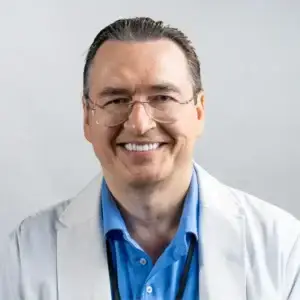
Dr. Rostislav Ignatov, MD
Chief Medical Officer
New Bedford continues to face one of the most severe behavioral health crises in Massachusetts. In 2023, the city recorded 78 opioid-related overdose deaths, a decline from 92 in 2022 but still among the highest per capita in the Commonwealth. Toxicology confirmed fentanyl in nearly 96% of these fatalities, underscoring the dangers of today’s illicit drug supply.
At the same time, New Bedford demonstrates remarkable community action. From 11,000+ naloxone kits distributed in a single year to the launch of two mobile crisis vans operating around the clock, the city is mobilizing every available tool to save lives and expand access to care.
This guide explains how to access addiction, mental health, and recovery services in New Bedford, helping residents navigate a complex but determined treatment system that combines public programs, nonprofit supports, and private care.
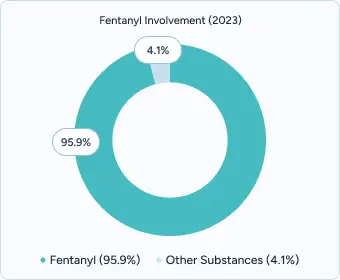

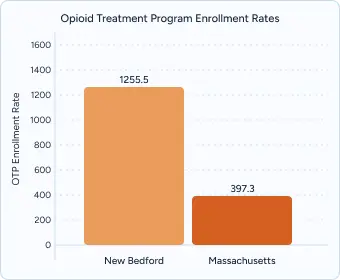
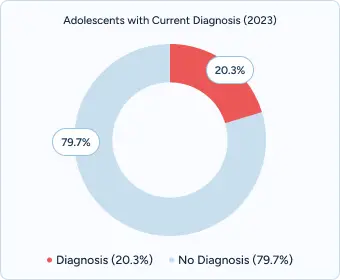
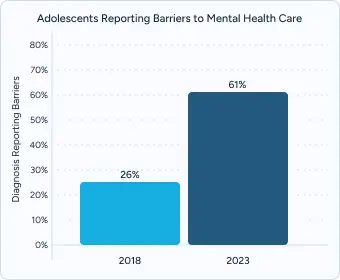
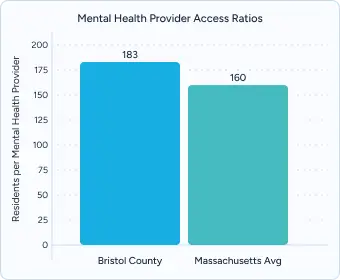
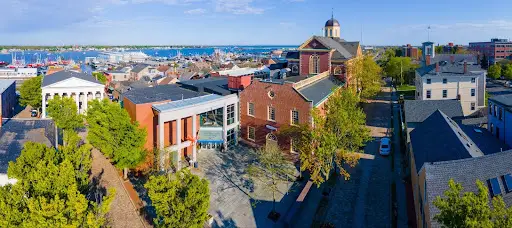
New Bedford has built a broad network of resources that work together to support residents in crisis, in recovery, and on the path to long-term wellness. At the center of this system is the Child & Family Services Community Behavioral Health Center (CBHC) in downtown New Bedford, which serves as the city’s main entry point for urgent behavioral health needs. The CBHC provides 24/7 mobile crisis response, walk-in urgent care, psychiatric evaluations, and short-term stabilization for both youth and adults, while also linking residents to longer-term treatment and recovery options like the Haven Detox – New England.
Emergency care plays a critical role in the city’s continuum of services. Southcoast Health – St. Luke’s Hospital serves as the hub for emergency psychiatric and medical stabilization, responding to overdoses and mental health crises while connecting patients to follow-up care through discharge planning.
For ongoing and integrated care, the New Bedford Community Health Center connects behavioral health with primary care, making it easier for patients to receive screenings, counseling, and treatment referrals alongside their regular medical visits. Seven Hills Behavioral Health serves as a cornerstone of community-based services, offering harm reduction, HIV and STI prevention, naloxone distribution, and outpatient recovery supports that lower barriers and help residents move toward treatment.
Transportation ensures that these services remain accessible to all. The Southeastern Regional Transit Authority (SRTA) provides connections between neighborhoods and key clinics or hospitals, while MassHealth PT-1 non-emergency transportation covers rides to addiction and mental health appointments. ADA paratransit services also ensure access for residents with mobility or disability needs. Together, these supports create a coordinated network that strengthens recovery pathways across New Bedford.
MassHealth covers 100% of the costs for detox, residential programs, outpatient therapy, crisis stabilization, and medications such as buprenorphine, methadone, and naltrexone. Copayments for substance use disorder services have been eliminated, and eligibility extends to residents up to 138% of the federal poverty level. Enrollment is available through the Massachusetts Health Connector, with applications in English, Portuguese, Spanish, and Khmer to reflect New Bedford’s diverse population.
For residents not eligible for MassHealth, MBHP provides financial assistance for individuals and families with incomes up to 300% of the federal poverty level. This program ensures access to a broad range of addiction and mental health services for households that fall above the Medicaid threshold.
The Health Safety Net program covers essential services at participating hospitals and community health centers for those without insurance. In New Bedford, this includes access to urgent psychiatric stabilization, outpatient therapy, and addiction treatment delivered through local providers.
Community health centers and nonprofits in New Bedford offer multilingual enrollment support, helping residents apply for MassHealth, MBHP, or Health Safety Net programs. Navigators assist families in completing paperwork, verifying eligibility, and connecting to covered treatment quickly.
Private programs accelerate admission and reduce delays from assessment to treatment. Most coordinate benefits checks quickly, offer medical detox when needed, and provide a full menu of evidence-based therapies.
Advantages of private treatment include:
The Haven Detox in Worcester offers 24/7 medical detox and dual-diagnosis care with proven therapies—CBT, DBT, EMDR, Motivational Interviewing—plus Family Therapy and holistic supports (yoga, reiki, art therapy). GeneSight testing helps personalize psychiatric medications. High staff-to-client ratio, resort-style amenities, and transportation support statewide. Most major insurance (including MassHealth) is accepted.
New Bedford offers a diverse network of mental health supports delivered through hospitals, community clinics, and nonprofit organizations. The Child & Family Services Community Behavioral Health Center (CBHC) and the New Bedford Community Health Center integrate behavioral health with primary care, giving residents the ability to receive mental health screenings, counseling, and referrals in the same setting as their routine medical visits.
Just outside the city, Southcoast Behavioral Health in Dartmouth provides 24/7 inpatient psychiatric care for both adults and adolescents, with specialized programs for individuals managing dual diagnoses.
New Bedford offers a diverse network of mental health supports delivered through hospitals, community clinics, and nonprofit organizations. The Child & Family Services Community Behavioral Health Center (CBHC) and the New Bedford Community Health Center integrate behavioral health with primary care, giving residents the ability to receive mental health screenings, counseling, and referrals in the same setting as their routine medical visits.
Across neighborhoods, organizations such as Seven Hills Behavioral Health strengthen access by offering bilingual Portuguese and Spanish clinicians, trauma-informed therapy, and peer-led recovery supports. These services bridge cultural and language gaps, ensuring that New Bedford’s diverse communities can connect to the care they need in settings that feel welcoming and responsive.
PAACA (Positive Action Against Chemical Addiction)
PAACA provides free peer-led recovery services, including harm reduction, overdose prevention, peer coaching, and sober social events. The center also distributes naloxone and fentanyl test strips while connecting residents to outpatient and residential treatment.
Greater New Bedford Opioid Task Force
This coalition brings together city agencies, nonprofits, and healthcare providers to coordinate prevention, treatment, and recovery efforts. The Task Force also oversees how opioid settlement funds are allocated for maximum community impact, ensuring resources reach the programs that need them most.
MASH-certified residences in New Bedford and surrounding towns offer structured transitional housing with 24/7 staffing, group meetings, and accountability measures. These programs help residents maintain sobriety while working, attending outpatient programs, or pursuing education, creating a safe and supportive environment during recovery.
Local programs like Steppingstone transitional homes and other certified residences provide options for men, women, and families rebuilding their lives in recovery. These residences focus on long-term stability by fostering community accountability and promoting independence through structured support systems.
AA and NA meetings are held daily across New Bedford in churches, community centers, and recovery hubs. The Fall River Area Intergroup and Southeastern Massachusetts networks list dozens of options every week, giving residents consistent opportunities for connection and recovery support.
Bilingual supports are available through Portuguese- and Spanish-speaking groups such as Esperanza, ensuring culturally specific spaces for recovery. Young adult groups (ages 18–25) also combine peer mentorship with sober social events and job readiness support, helping create positive alternatives and stronger community bonds for long-term success.
Comprehensive assessments should address both addiction and mental health together, since many residents of Greater New Bedford present with co-occurring conditions. Dual-diagnosis programs prevent gaps in care and help ensure people aren’t treated for one issue while the other goes unaddressed.
Medication-assisted treatment (MAT) availability is a sign of strong programming. Effective providers offer buprenorphine, methadone, and naltrexone (Vivitrol) alongside therapy and counseling. These medications reduce cravings, stabilize recovery, and lower relapse risk.
Culturally responsive care matters in New Bedford’s diverse neighborhoods. Look for services with Portuguese- and Spanish-speaking clinicians, programs affirming LGBTQ+ residents, and community partnerships that understand the needs of immigrant families. Providers that embed cultural context into therapy create safer, more effective healing spaces.
Aftercare coordination should begin during treatment, not after. The strongest programs connect clients to outpatient therapy, peer recovery centers, and sober housing before discharge. In New Bedford, this may include referral to PAACA, MASH-certified sober homes, or ongoing therapy at Child & Family Services. Warm handoffs reduce the risk of relapse and ensure clients feel supported at every step.
Family involvement and support services are proven to strengthen recovery outcomes. Programs that include family education, therapy sessions, and peer-support groups build resilience and reduce relapse risk. In New Bedford, culturally tailored supports—such as Portuguese- and Spanish-language family groups—help families heal together.
Immediate Access
Individualized Treatment Planning
Medical Oversight & Safety
Evidence-based therapies such as CBT, DBT, EMDR, Motivational Interviewing, and Family Therapy form the foundation of treatment. Programs also integrate trauma-informed practices and relapse-prevention planning.
Holistic supports — yoga, nutrition, reiki, and art therapy — help restore balance and reduce stress, complementing clinical care.
Alumni networks and aftercare provide ongoing support beyond discharge, connecting clients with peer groups, sober housing, and mentorship to sustain recovery momentum.
Insurance and financial navigation specialists guide families through MassHealth, MBHP, and private insurance, ensuring benefits are maximized and treatment access is not delayed.
Professional treatment in New Bedford offers more than symptom relief — it delivers immediate access, personalized care, and wraparound supports proven to improve long-term outcomes.
Begin your recovery journey with immediate access to New Bedford’s comprehensive addiction and mental health treatment resources.
MassHealth eligibility is typically confirmed within 24–48 hours, with no copays for substance use disorder services. For private insurance, financial advocates provide cost estimates, explain coverage, and assist with prior authorizations. Verification staff also complete benefits analysis during initial consultation calls, ensuring families know their options before treatment begins.
Same-day psychiatric evaluations and substance use assessments are available, with next-day placement into residential care when clinically indicated. Emergency assessments include suicide risk screening, medication evaluation, and safety planning, followed by scheduled outpatient or community-based appointments within 72 hours.
The Community Behavioral Health Center (CBHC) provides same-day urgent evaluations and mobile crisis intervention. Private centers such as The Haven Detox offer same-day assessments with next-day admission when clinically appropriate.
Yes. MassHealth covers detox, residential, outpatient, and medications such as buprenorphine, methadone, and naltrexone. Copays for substance use disorder services have been eliminated. If you are not eligible, the Massachusetts Behavioral Health Partnership (MBHP) or the Health Safety Net can help cover costs.
You can still access treatment. CBHCs accept uninsured patients and connect them to funding support. Haven provides insurance verification within 24–48 hours, exploring MassHealth, MBHP, or private pay options with the help of financial advocates.
Yes. New Bedford has large Portuguese- and Spanish-speaking communities, and many programs—including Child & Family Services, Seven Hills Behavioral Health, and PAACA—provide bilingual clinicians and interpreters. Mutual-aid groups like Esperanza also host recovery meetings in Spanish
The Haven Detox programs include evidence-based approaches such as Cognitive Behavioral Therapy (CBT), Dialectical Behavior Therapy (DBT), Eye Movement Desensitization and Reprocessing (EMDR), Motivational Interviewing, and Family Therapy. Holistic supports like yoga, art therapy, and Reiki complement clinical care.
Research shows that programs lasting 90+ days significantly improve long-term recovery outcomes. This usually includes a continuum of care: detox, residential treatment, outpatient care, and structured aftercare.
Yes. Family engagement reduces relapse risk and strengthens recovery. Haven integrates Family Therapy, while community programs offer bilingual family education groups and support services.
Families can still get help. Peer specialists at CBHCs and nonprofits like PAACA provide coaching, intervention guidance, and connections to Al-Anon or family therapy. Haven also offers family consultations to help prepare loved ones for treatment entry.
Yes. Several New Bedford programs—including Southcoast Behavioral Health and community peer groups—offer specialized services for ages 18–25. These may include mentoring, job readiness workshops, and young-adult recovery meetings
Yes. SRTA buses and ADA paratransit serve New Bedford. MassHealth provides PT-1 rides for medical appointments, including addiction treatment. Some private programs, including Haven, offer statewide transportation support.
Detoxing without medical oversight is dangerous. Professional care ensures:
Dual-diagnosis care to address both addiction and mental health together
Recovery doesn’t stop at discharge. Strong programs provide aftercare planning, warm handoffs to outpatient care, and access to alumni networks. Haven maintains an Alumni Program with events, peer mentoring, and ongoing groups to help sustain recovery.
24/7 Support
No Commitment
100% Private
There’s no catch. Checking your insurance is simply a way to see what your plan covers — it doesn’t lock you into treatment, notify anyone, or cost you anything. You get answers upfront to decide what makes sense for you.
Protecting your privacy matters! No information or notifications are ever sent to your employer or family — whether you check your insurance online or call. Everything is handled through secure, encrypted systems that meet strict medical privacy laws. You stay in control of your information!
Luckily, most insurance policies cover treatment here. Depending on the healthcare you’ve already had this year, costs could even be zero. Instead of worrying, let’s just find out what your plan covers.
Most likely. We work with major providers like Cigna, Aetna, and United Healthcare, public insurances like Tricare and tribal plans, and even smaller plans like Surest Bind and Harvard Pilgrim. The quickest way to know for sure is to check online or call. It’s a quick, private way to understand what is covered upfront.
Verifying your insurance isn’t a commitment to start treatment — it’s simply a way to see what your options are. Knowing your coverage ahead of time helps you make more informed, confident decisions. It also helps flag a spot, so you’re able to get right in if you ever do decide you’re ready.
You need your policy number to check your specific policy online. If you want general information, just call. You likely have questions beyond insurance anyway. Reaching out now helps you figure out the right fit if or when you’re ready. You don’t have to put off the call until you’re in crisis. Calling is not scary, I promise!